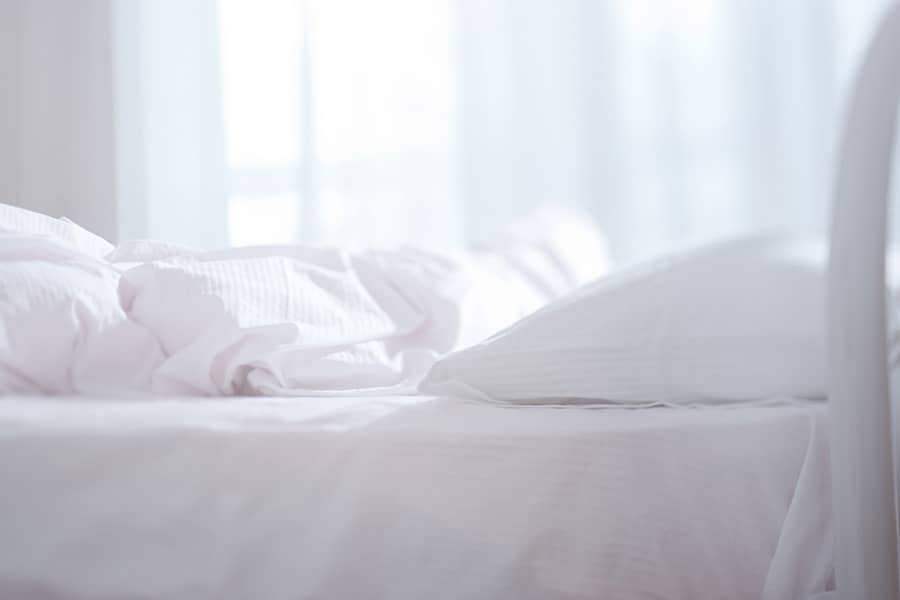Recovery is largely about ritual, and at Two Dreams we encourage the establishment of rituals that promote regular, high quality sleep.
For example, each morning residents on the Outer Banks embark on a sun salutation walk on the beach to expose their retinas to sunlight, encouraging the switch from a sleep state (when GABA brain receptors are activated) to a wake state (when glutamate brain receptors are activated.) In the evening, we recommend shutting off all electronic devices at 8pm, so as to not confuse the body’s sleep/wake neurotransmitter cycle with the unnatural light from the screens. I won’t go into further scientific detail in this article, but if you want to learn more about the neurotransmitters of sleep you should read this informative publication from the Journal of Clinical Psychiatry: https://www.ncbi.nlm.nih.gov/pubmed/15575797 .
Another ritual we encourage is putting away all food at 8pm. Eating causes the body to go into an arousal state and devote energy to digestion, when ideally it should be settling down for sleep. If you’re starving or hypoglycemic, a small snack is acceptable before bed to avoid mid-night awakenings, but otherwise it’s best to avoid food and drink right before lights-out. Try to plan out your eating patterns so that your last meal falls well before you fall asleep.
In fact, planning out the foods you eat throughout the whole day is not a bad idea either in terms of assuring a good night’s sleep. Certain dietary options have been linked to decreased sleep quality and can have effects on the body that last well into the night:
High Fat/Fried Foods
Fatty foods stimulate digestive tract contractions, which can either cause your stomach to empty slowly, worsening constipation, or they can cause your stomach to empty rapidly, leading to diarrhea. As a result of this gastrointestinal distress, you are more likely to experience fragmented sleep.
Caffeinated Beverages
Caffeine is a stimulant that causes temporary alertness by increasing adrenaline production and preventing certain sleep-inducing chemicals from taking effect. It’s best to avoid caffeine after 2pm, because it has a tendency to alter the body’s sleep/wake cycle for a long time after consumption. If you’re going to consume caffeine, we recommend drinking a shot of it before a 20-minute power nap. This strategy has been scientifically demonstrated to enhance the napping experience, since caffeine takes about 20 minutes to cause arousal.
Chocolate
Cocoa beans naturally contain caffeine so any source of chocolate is going to harbor some form of the stimulant. Darker chocolate contains a higher percentage of cocoa beans, and therefore a higher percentage of caffeine. In addition, chocolate contains theobromine, a compound known to increase heart rate and cause arousal.
Tyramine-Rich Foods
Foods such as aged cheeses, eggplant, soy sauce, and tomatoes contain an amino acid called tyramine. This compound causes the brain to release a stimulant called norepinephrine, which causes wakefulness.
Fruits and Vegetables with a High Water Content
Celery, cucumbers, watermelons, etc. are chock-full of water and therefore natural diuretics. Waking up multiple times throughout the night with a full bladder is sure to disturb your sleep cycle, so try to avoid these foods close to bedtime.
Sugary Foods
Candy, or other treats high in sugar, will likely cause spiking blood sugar levels and rapid release of insulin to control them. The spiking blood sugar levels may cause a “sugar crash” that may make it easy to fall asleep, but ultimately the fluctuations will make staying asleep a difficult task.
Peppermint
Studies have shown that the scent of peppermint may increase alertness, decrease fatigue, and work as a central nervous system stimulant.
Sorbitol-Rich Foods
Sorbitol is an artificial sweetener that is not only added to gum and diet foods, but is also naturally found in prunes, apples, and peaches. Sorbitol commonly causes digestive problems such as gas, bloating, and diarrhea so try to avoid it when possible.
Citric Fruits
Citric fruits, such as oranges, lemons, limes, and grapefruits, contain large amounts of citric acid, which can cause gastrointestinal distress and/or heartburn. In addition to the pain they cause, these ailments may also exacerbate asthma or previously existing sleep breathing disorders, such as sleep apnea.
Spicy Foods
Spicy foods stimulate the digestive system, which can potentially cause gastric distress while you’re trying to sleep. Try to stick to bland foods as bedtime approaches.
High Fiber Foods
Comfort is key for ideal sleeping conditions, so neans, broccoli, cauliflower, and other high fiber foods should be avoided. These dietary additions are likely to cause bloating, gas, and general discomfort which can prevent you from falling asleep or can cause you to wake up during the night.
Many people believe that alcohol serves as an effective sleep aid, as it initially has a sedating effect, but it is ultimately a detriment to high quality rest. Alcohol disturbs rapid eye movement (REM) sleep, meaning that sleep quality is significantly lowered after drinking. This lack of REM sleep negatively affects daytime memory, concentration, and motor skills, not to mention mood. It can suppress breathing, triggering sleep apnea and other breathing difficulties that cause nighttime awakenings. Additionally, alcohol damages the lining of the stomach and changes liver metabolism, which can cause indigestion and other health problems that may keep you up at night.
For more tips on sleep hygiene, visit our sleep hygiene website section (hyperlink: /holistic-health/sleep-hygiene )
Sources Cited:
http://www.nytimes.com/2009/01/13/health/13real.html
http://www.wju.edu/about/adm_news_story.asp?iNewsID=1484&strBack=%2Fabout%2Fadm_news_archive%2Easp
http://www.everydayhealth.com/digestion-photos/foods-to-avoid-during-digestive-problems



